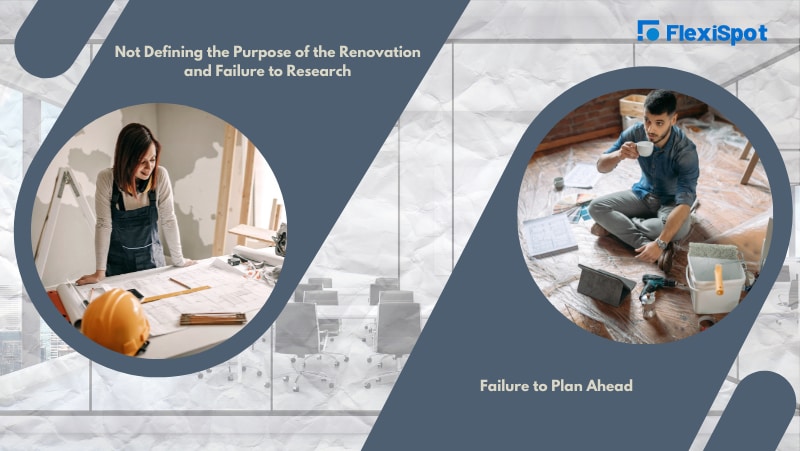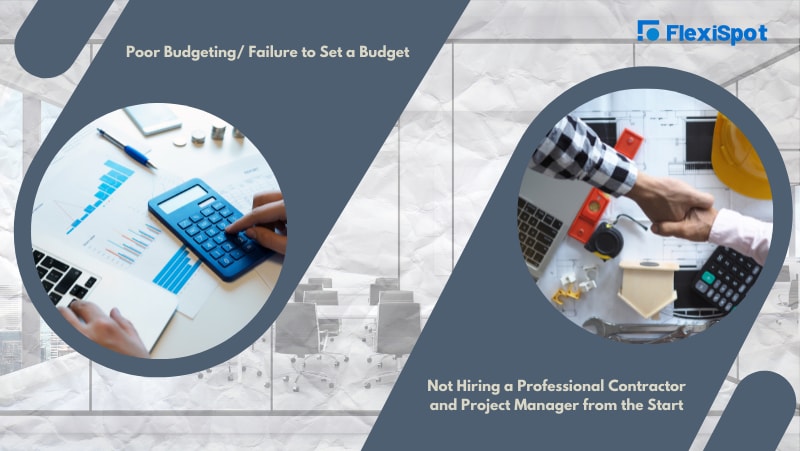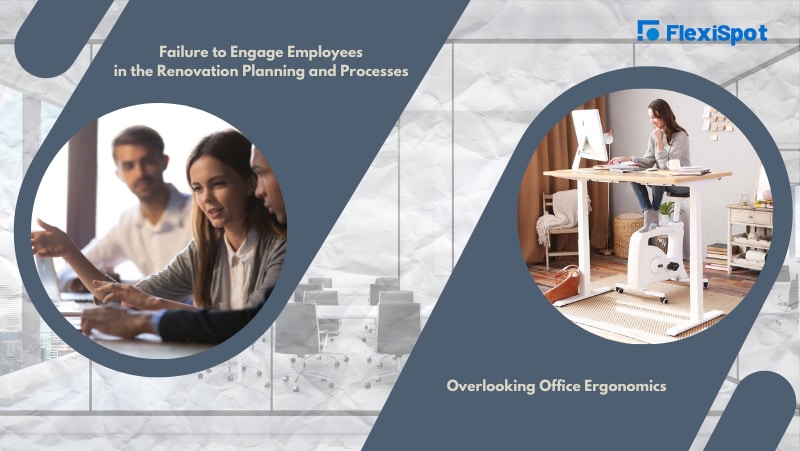Renovating your office can be a great way to refresh your workspace and make it more comfortable and functional for your employees. However, businesses make a few common mistakes during office renovations that can cause problems down the road. From choosing the wrong contractor to failing to plan for disruptions, read on for a few common mistakes people make when renovating their office space - and how to avoid them.
Here are some of the mistakes you should avoid:
1. Not Defining the Purpose of the Renovation and Failure to Research
Before you start tearing down walls or shopping for new furniture, you need to take a step back and think about why you're renovating in the first place. What are your goals? Do you want to create a more collaborative environment? Improve employee morale? Increase productivity? Once you've defined your goals, you can start making decisions about the best way to achieve them.
Research is also an important aspect before starting the renovation. Shallow research or failure to completely do any research can significantly compromise an office renovation project. Research enables you to better understand construction dynamics, budget, and plan for unforeseeable circumstances. You can research a wide variety of issues; for instance, you can research current office trends, good remodeling practices, ergonomic office furniture, office plants, etc. By skipping research, you'll virtually fail to consider your needs before starting the renovation, compromising the overall delivery of the project.
2. Failure to Plan Ahead
One of the people's biggest mistakes when renovating an office is failing to plan ahead. This can lead to delays, budget overruns, and other problems. By carefully planning your renovation, you can avoid these issues and ensure a smooth, stress-free process.
Again, most firms fail to realize that office renovation may temporarily put their business on hold and therefore requires careful downtime planning regarding financial implications and customer retention. Firms may lose out on a lot of business by closing down for renovations for some days. Therefore, business disruption should also be factored into the planning to prevent unnecessary service-delivery disruption and failure to meet financial targets.
Firms may want to renovate during non-business hours or on weekends to minimize business disruptions. Alternatively, office employees can work from home during the course of the renovation.
3. Poor Budgeting/ Failure to Set a Budget
Renovating an office can be expensive, so it's important to set a budget and stick to it. Don't overspend on features that aren't essential or skimp on important things, like comfortable furniture or adequate lighting. Planning and being strategic about your spending will help keep costs under control. Ensure you conduct in-depth market research and set a precise budget.
Also, remember that no matter how well you plan, there's always a chance that something will go wrong during a renovation. That's why it's essential to budget for contingencies, so you won't be caught off guard if something unexpected happens. Ensure you allocate an additional 20% of the initial budget to cater for unforeseen expenses, design changes, or emergencies that may crop up during the course of the renovation. This way, the renovation works will always be on track and delivered within the desired timeline.
Don't start the renovation until you're ready to finish it - there's no point in starting if you don't have enough time or money to see it through.
4. Not Hiring a Professional Contractor and Project Manager from the Start
Do-it-yourself projects can be a great way to save money, but some things are best left to the professionals. Office renovations are one of those things. Not hiring a professional contractor can be a costly mistake. You may pay more in the long run if the renovation is not done properly. An experienced contractor will have the experience and knowledge to get the job done right while avoiding common mistakes.
A professional contractor will also be able to help you save time and money by suggesting cost-effective solutions to common problems encountered during renovations.
While looking for professionals, check out their experience, credentials, testimonials, area of expertise, and more to avoid hiring quacks, who may compromise on the functionality, quality, or even the delivery of the project.
5. Not Taking into Account the Zoning Laws and Building Codes
Zoning laws and building codes exist for a reason — they're in the place to protect people from potentially dangerous renovations. You're putting yourself, your employees, and anyone who visits your office at risk by ignoring zoning laws and building codes.
Some of the most common dangers associated with unapproved office renovations include fire hazards, structural problems that can lead to collapse, exposure to toxic materials, and electrical wiring issues that can cause shocks or fires.
In addition to safety concerns, there are financial implications to consider when renovating an office without following zoning laws and building codes. You may be fined for violating the regulations, or worse yet, your renovation may not be approved by the city, and you will have to start from scratch.
If you're thinking about doing a renovation project in your office, it's important to consult with your local zoning board and/or building inspector first to make sure you're following all the rules. This will ensure the renovation works run smoothly without any back-and-forth struggles with construction authorities and regulators.
6. Comprising on Quality to Lower Cost
It's important to be mindful of your budget when renovating an office, but that doesn't mean you should skimp on quality. Choosing cheap materials or hiring inexperienced contractors can cost you more in the long run.
Quality and durable materials often cost more but last longer compared to cheap products. Go for quality products, especially those that face daily use and abuse, including faucets, appliances, hardware, doors, kitchen cabinets, floor tiles, etc. This will definitely take a considerable portion of your budget but will enable you to save costs in the long run as opposed to frequent subsequent repairs.
Strive for a balance between affordability and quality, and you'll certainly be happy with the results.
7. Failure to Engage Employees in the Renovation Planning and Processes
Your office renovation should be focused on improving the work environment for your employees, so it's crucial to involve them in the planning process from the beginning.
During the planning phase of the renovation project, you may want to conduct a survey to get the challenges the employees might be going through in the office and how a renovation can fix these challenges. What do they think would make the space more effective? How can the layout be improved to increase collaboration? What type of furniture would be most comfortable and ergonomic? Asking for employee input will help ensure that the outcome is a space that meets their needs, improves their productivity, and guarantees work satisfaction.
8. Overlooking Office Ergonomics
It's not just a mistake to overlook office ergonomics during a renovation – it can be downright dangerous. Office workers can suffer from all sorts of musculoskeletal injuries if their workstation isn't set up properly.
That's why it's so important to have an ergonomic assessment done before starting any renovation project. An ergonomic assessment will help identify potential hazards and recommend solutions that will make your office safer and more comfortable for everyone who works there.
Be sure to consider ergonomic factors such as lighting, furniture, and layout. For example, you might want to add adjustable height desks or ergonomic office chairs so that employees can find the perfect position for their individual needs. You might also want to look into improving lighting and ventilation to create an environment that will help boost productivity.
9. Too Much Focus on Aesthetics Over Functionality and Practicality
An ideal office space balances aesthetics, functionality, and practicality. A common office renovation mistake that most firms tend to make is prioritizing aesthetics over functionality and practicality. While a plush-looking office is pleasing in every way possible, a lack of functionality and practicality can compromise the intended purpose of the office.
A practical way to avoid this common mistake is to involve employees in the renovation planning and process. The renovated space should meet a balance of different needs, including ergonomics, health, and safety, security, functionality, practicality, and aesthetics.
10. Forgetting the Little Things
While undertaking office renovation projects, contractors fail to consider essential things that may compromise the functionality of the office. Little things such as electric outlets, lighting fixtures, lighting, emergency exits, and more can significantly compromise the functionality and practicality of the office.
This mistake can easily be avoided by undertaking functional design planning before executing the project. Office renovations are meant to enhance the aesthetic value, functionality, and practicality of the office, and therefore small details should not be missed.
11. Not thinking about the long term
Office renovations are not a one-time event; they need to be planned for with future changes in mind. How will the space be used in five or ten years? Will it still meet the needs of your business? How will it need to adapt as your business grows? Is there anything you can do to make it more flexible and adaptable for future changes? Asking these types of questions will help you create a space that will stand the test of time.
12. Not thinking about the environment
When renovating an office, it's important to think about the environment. How can you make the space more energy-efficient? Can you use recycled materials or sustainable finishes? Thinking about the environment will help reduce your carbon footprint and save you money in the long run.
Conclusion
Office renovations can be a great way to improve productivity and creativity in the workplace, but only if they are done correctly. A small mistake in an office renovation project can greatly compromise the delivery of the project, let alone other consequences, including financial loss, loss of valuable time, and increased business disruptions. Follow our tips to ensure your office renovation goes smoothly and that you're getting the most out of your investment.







